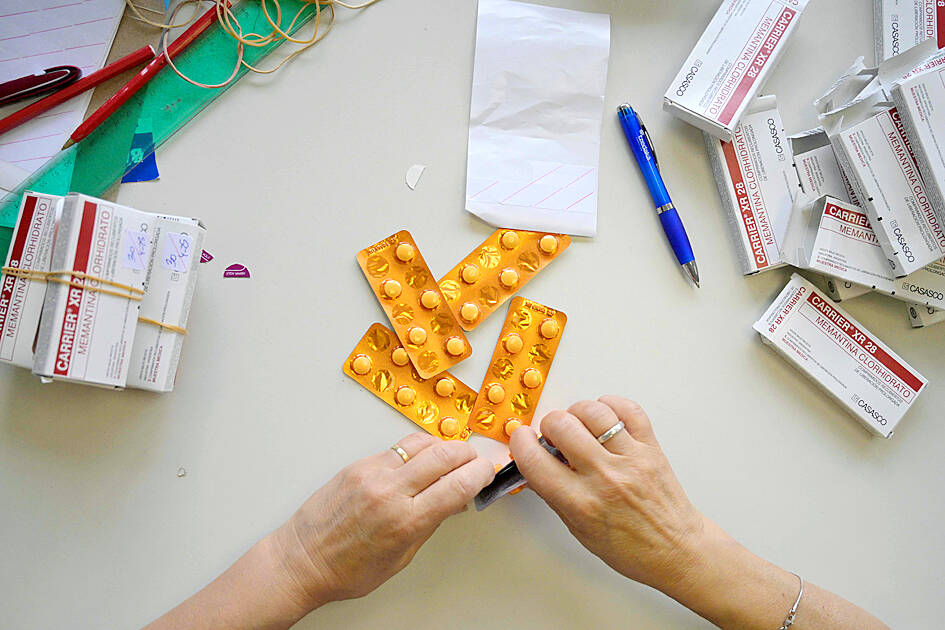The Centers for Disease Control (CDC) yesterday announced that the Executive Yuan has approved a cross-ministerial five-year “national one-health antimicrobial resistance (AMR) control action plan” for addressing the AMR threat at the national level, starting next year.
The WHO listed AMR as one of the top 10 global health threats, and an UN General Assembly high-level meeting on AMR is to be held in New York tomorrow, in which global leaders are expected to reaffirm their determination to tackle AMR, CDC Deputy Director-General Philip Lo (羅一鈞) said.
The Executive Yuan in July approved the Ministry of Health and Welfare’s five-year AMR control action plan, which would be implemented from next year to 2029, he said.

Photo: AFP
The plan would be implemented by the CDC and Food and Drug Administration, as well as the Ministry of Agriculture, to monitor and prevent AMR, effectively control antimicrobial use in animals and plants, and raise awareness among the public and healthcare professionals, Lo said.
National Taiwan University vice president Chang Shan-chwen (張上淳), an infectious disease expert, said the WHO estimated that globally there are 4.95 million deaths per year associated with AMR, and without a stronger response there would be an average loss of 1.8 years of life expectancy globally by 2035.
The WHO also estimated that a continued rise in resistance would lead to a reduction of 2 to 3.5 percent of the global GDP, and a decline of up to 7.5 percent annually in livestock production, he said.
Chang said the UN’s WHO, Food and Agriculture Organization, and World Organization for Animal Health in 2015 adopted a global action plan on AMR, which underscored the need for an effective “one health” approach — a joint effort by various disciplines coming together to provide solutions for human, animal and environmental health against AMR.
The UN General Assembly first held a high-level meeting on AMR in 2016, in which global leaders recognized that AMR is a global health threat and promised to invest continuous and sufficient funding and human resources into setting up and executing national-level action plans, he said.
The CDC established a national AMR monitoring system in 2009, ran the Antimicrobial Stewardship Program from 2013 to 2015 and offered guidelines for hospitals to optimize the use of antibiotics, Chang said.
It also implemented an AMR control action plan in some hospitals from 2020 to this year, and cooperated with the Ministry of Agriculture under the “one health” approach, he added.
However, some healthcare professionals have warned that the COVID-19 pandemic might have contributed to the worsening of AMR, which is also a global issue, Chang said.
There should be a larger-scale nationwide action plan to fight AMR which is not limited to some hospitals, he said.
The Executive Yuan plans to allocate a NT$200 million (US$6.26 million) budget for the plan next year, Lo said.
Two of the seven main goals in the five-year plan include “reducing human antimicrobial use in healthcare facilities by 5 percent” and “reducing the incidence rate of Carbapenem-resistant Acinetobacter baumannii (CRAB) infection among hospitalized patients by 10 percent,” he said.
Of the eight “superbugs” (strains of bacteria that are resistant to multiple antibiotics) monitored in Taiwan, CRAB is the most common bacteria, accounting for about 75 percent of superbugs in intensive care unit patients and about 60 percent of superbugs in hospitalized patients, he added.

Snow fell in the mountainous areas of northern, central and eastern Taiwan in the early hours of yesterday, as cold air currents moved south. In the northern municipality of Taoyuan, snow started falling at about 6am in Fusing District (復興), district head Su Tso-hsi (蘇佐璽) said. By 10am, Lalashan National Forest Recreation Area, as well as Hualing (華陵), Sanguang (三光) and Gaoyi (高義) boroughs had seen snowfall, Su said. In central Taiwan, Shei-Pa National Park in Miaoli County and Hehuanshan National Forest Recreation Area in Nantou County saw snowfall of 5cm and 6cm respectively, by 10am, staff at the parks said. It began snowing

Global bodies should stop excluding Taiwan for political reasons, President William Lai (賴清德) told Pope Francis in a letter, adding that he agrees war has no winners. The Vatican is one of only 12 countries to retain formal diplomatic ties with Taiwan, and Taipei has watched with concern efforts by Beijing and the Holy See to improve ties. In October, the Vatican and China extended an accord on the appointment of Catholic bishops in China for four years, pointing to a new level of trust between the two parties. Lai, writing to the pope in response to the pontiff’s message on Jan. 1’s

HOLIDAY EXERCISE: National forest recreation areas from north to south offer travelers a wide choice of sights to connect with nature and enjoy its benefits Hiking is a good way to improve one’s health, the Forestry and Nature Conservation Agency said, as it released a list of national forest recreation areas that travelers can visit during the Lunar New Year holiday. Taking a green shower of phytoncides in the woods could boost one’s immunity system and metabolism, agency Director-General Lin Hwa-ching (林華慶) cited a Japanese study as saying. For people visiting northern Taiwan, Lin recommended the Dongyanshan National Forest Recreation Area in Taoyuan’s Fusing District (復興). Once an important plantation in the north, Dongyanshan (東眼山) has a number of historic monuments, he said. The area is broadly covered by

A Vietnamese migrant worker on Thursday won the NT$12 million (US$383,590) jackpot on a scratch-off lottery ticket she bought from a lottery shop in Changhua County’s Puyan Township (埔鹽), Taiwan Lottery Co said yesterday. The lottery winner, who is in her 30s and married, said she would continue to work in Taiwan and send her winnings to her family in Vietnam to improve their life. More Taiwanese and migrant workers have flocked to the lottery shop on Sec 2 of Jhangshuei Road (彰水路) to share in the luck. The shop owner, surnamed Chen (陳), said that his shop has been open for just